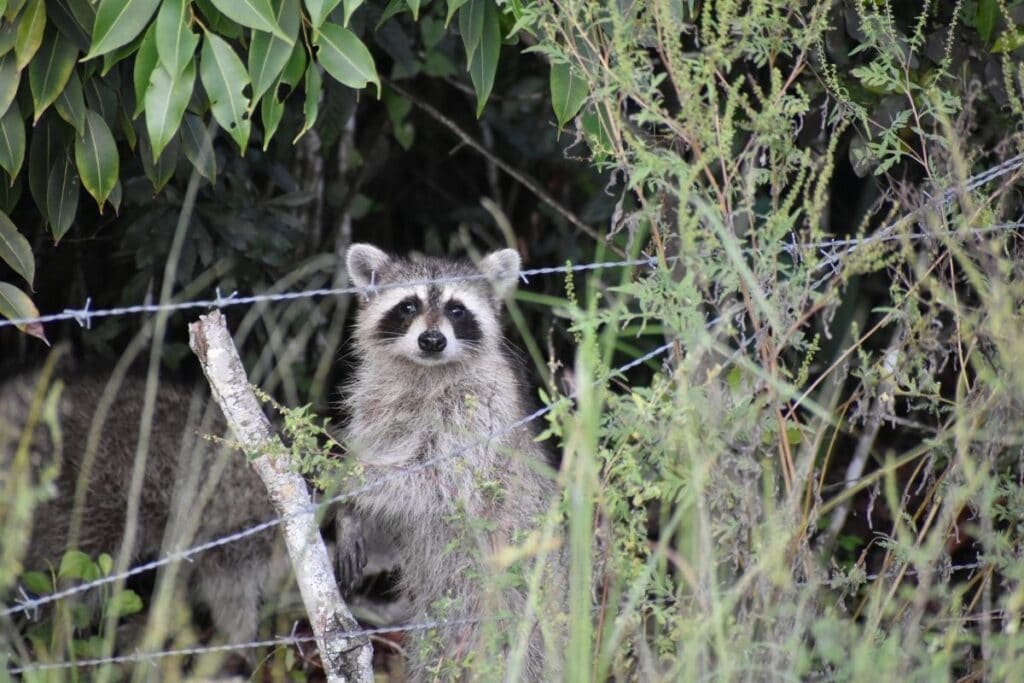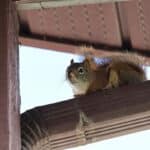Want to know how to keep raccoons out of the garden? These tips should help.
There is something special about having wildlife come around the garden and enjoy the outdoor spaces around your home. Visiting wildlife is often a sign that your property is safe and valuable to the local wildlife. However, we do not feel that way when it comes to raccoons.
Sure, some might say that raccoons are cute – and maybe some of them are. However, they are also ungrateful animals that can dig holes in your lawn, rummage around in your trash, and eat the plants in the vegetable gardens. In general, their propensity to wreak havoc in the garden outweighs their slightly endearing qualities.
If you suspect that raccoons are coming around the home, eating your plants, and using the yard as their bathroom, then keep on reading. Below you find some tried and true methods for keeping the little buggers from coming back.
What Attracts Raccoons to the Garden?
Raccoons are opportunistic animals. They will come into your garden whenever there is an opportunity for something they need. For the most part, raccoons are attracted into your garden by the following five items.
- Fruits & veggies- certain fruits and veggies that we enjoy growing are also enjoyed by raccoons, such as apples, peaches, corn, peas, and potatoes.
- Shelter- raccoons are always on the lookout for haven, especially pregnant females who are about to have their nursery of baby raccoons.
- Alluring Aromas- some backyard smells are irresistible to raccoons, particularly pet food and BBQ.
- Water- if water is hard to come by in the wild, raccoons may try to use your pool or koi pond for hydration and bathing.
- Trash- one man’s trash is another raccoon’s treasure. The food scraps we leave behind in the garbage are a large incentive for hungry raccoons.
How Do You Stop Raccoons From Getting Into Your Garden?
If raccoons are coming into your yard and wreaking havoc in your garden, it’s time for an intervention. Like with other backyard pests, the most effective strategy for keeping raccoons out of the garden is one that employs multiple tactics at once.
When it comes to designing a raccoon prevention plan, you ought to consider the following best way to keep raccoons away:
- Creating odor barriers with scents that raccoons dislike
- Installing a physical fence that bars entrance to raccoons
- Removing opportunities for shelter, safe passage, and food sources
- Scaring raccoons with certain techniques and tools
- Hiring a professional to trap and release the raccoons
10 Tips to Keep Raccoons Away from Your House
Over the years, we’ve had to deal with various pests getting into the garden, including raccoons. So we’ve compiled this list of useful tips on how to scare raccoons away from your house and out of the backyard at night to help inform your prevention strategy.
Figuring out which strategy works best may take some time – and often, a combination of multiple tips will be the most effective.
1. Spray Raccoon Repellent
Effective raccoon repellents rely on intense flavors and aromas to discourage raccoons. You can purchase products at your local garden center or hardware store. However, there are also plenty of quick and easy recipes for repellents you can make from home.
When it comes to what repels raccoons, hot chili peppers, citrus essential oils, ammonia, apple cider vinegar, coffee grounds, cinnamon, black pepper, predator urine and cayenne pepper are all examples of effective raccoon repellent ingredients. Simply mix them into a solution with water and spray the areas that you want raccoons to avoid. Remember, always reapply your repellent after rainfall and watering.
When using repellents to deter raccoons, we recommend switching up the mixture that you utilize. Over time, it’s possible for raccoons to become accustomed to the repellent you are using, but not if you keep them guessing with a variety of repellents.
2. Install Physical Barriers
Sometimes raccoons don’t get the message. So it may be necessary to install a physical barrier to bar them access. A sturdy fence around the garden is one of the most effective measures you can take. Plus, the raccoon proof fence will help keep out other critters as well.
A 2-wire raccoon electric fence is perhaps the most effective method for keeping these animals out of the garden.
However, if you cannot install an entire fence, perhaps consider creating a barrier around the specific problem areas or the most sensitive plants. When it comes to saving money on fencing, we recommend building your own. It’s possible to use salvaged and recycled materials to create a barrier that is both functional and stylish.
3. Board Up Opportunities for Shelter
Raccoons will jump at the opportunity to use your property as shelter if you let them. Raccoons love to use the crawl spaces under homes, backyard shed, porches and patios as their safe haven. This is especially true for pregnant female raccoons preparing to have their nursery.
So if you know your property has a few weak points that may be used for shelter, we recommend quickly closing off the entrance to the area. Oftentimes, chicken wire is a simple and affordable solution for boarding up spaces that may be used for shelter.
4. Keep the Garden Tidy
Raccoons will sometimes visit your garden in search of many of the same fruits and veggies that you enjoy as a gardener. This is especially true for low-hanging fruits and vegetables, as well as fallen produce.
You can keep raccoons at bay by making sure to harvest on time. You don’t want to leave the edible produce on the vine for too long. If you’re noticing fallen produce, we recommend cleaning it up and removing it from the garden as soon as possible.
If you cook outside, we also recommend keeping that space clean. Aromas from your BBQ may also be attracting raccoons into the yard. Never leave food scraps outside, and always bring your cooking utensils into the house afterward.
5. Secure the Trash Cans
Raccoons love to pillage easily accessible trash cans. The food scraps we throw away can be a valuable food source for them. Securing your garbage cans can be a quick and easy fix to reducing the presence of raccoons around your home and garden.
You can add extra security to non-locking trash can lids with bungee cords or cinder blocks. You can use heavy-duty trash bags to prevent tearing. We also recommend double-bagging items that are especially odorous, like meat and fish.
6. Install Motion-Activated Deterrents
Raccoons do the majority of their rummaging around after dark. That is why it can be difficult to scare them off when they come around. However, that’s not the case with motion-activated deterrents like lights and sprinklers.
We recommend installing motion-activated lights around the area where you store your trash cans. The sudden surge of light will scare these nocturnal animals away and warn you of their presence. On the other hand, motion-activated sprinklers are good for the garden. The sound and burst of water will scare off the raccoons every time.
7. Clean Up the Pet Food
Raccoons may be visiting your home because of the tantalizing aromas of pet food. This is especially the case for families that keep and feed their pets outside. If you feed your pets outside, make sure to bring the pet food bowls in overnight. Never leave any leftover food outside.
8. Try UltraSonic Barriers
Besides odor barriers and physical barriers, you may also consider using ultrasonic deterrents. Ultrasonic deterrents are devices that are triggered by motion. When triggered, they emit an ultrasonic sound that is inaudible to humans but that is unpleasant for raccoons. The noise will scare off raccoons and incentivize them not to come back in the future.
9. Secure the Bird Feeders
Believe it or not, raccoons are sometimes attracted to bird feed. If you keep bird feeders around your garden, you may be inadvertently attracting raccoons as well as wild birds.
If it’s not too much trouble, one strategy is to bring the bird feeders indoors overnight. However, you can also secure your bird feeders from raccoons by reconsidering where they are currently installed. If possible, we recommend installing your bird feeders in a location where only flying animals can access them.
10. Hire a Professional
If all else fails, and if the raccoon problem around your home is particularly bad, there may come a time when you need to enlist the help of a professional. This is especially the case if you need to trap the raccoons or seek professional assistance for raccoon removal.
We recommend never attempting to trap a wild animal by yourself. There may be specific laws or local ordinances related to trapping wild animals, so it’s important to consult a professional.
Professionals in pest control are experts in safely and humanely trapping raccoons. Plus, they will know about the local ordinances in regards to how the animal will need to be released back into the wild.
Tips to Prevent Raccoons from Eating Your Garden
After all the work you have invested in your garden, the last thing you want is for a band of rascal raccoons to come and destroy the place. You’ve worked too hard for that to become the outcome of your passion project.
So to prevent raccoons from destroying your garden, remember to focus on the following important points:
- Maintain a tidy yard, free from trash and food scraps
- Install barriers around the most prized areas of the yard
- Remove any opportunity for shelter in and around your property
- Stay on top of raccoon deterrent application, and remember to reapply after rainfall and watering.
If you can remember these four crucial elements, your raccoon prevention plan will prove to be effective and sustainable in the long run.
FAQs
What do raccoons hate the most?
Raccoons are repelled by strong odors and tastes, so some substances they dislike include ammonia, vinegar, and certain essential oils like peppermint or eucalyptus.
What is the best homemade raccoon repellent?
One effective homemade raccoon repellent is a mixture of hot pepper sauce or powder diluted in water and sprayed around the area you want to protect. Additionally, a solution of ammonia and water sprayed around the perimeter of your property can also deter raccoons.
What are raccoons naturally afraid of?
Raccoons are naturally afraid of loud noises, bright lights, and sudden movements. Utilizing devices such as motion-activated lights or sprinkler systems can deter them from areas they frequent.
Final words
We have highlighted the ways to deter raccoons from gardens such as using an electric fence for raccoon control as well as homemade repellents. You can also learn how to get rid of raccoons if you find that necessary.
Up next:
*image by Jaimie_Tuchman/depositphotos







